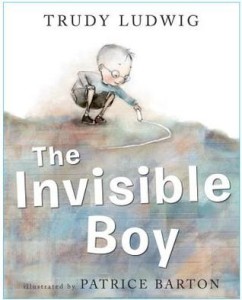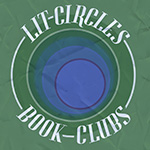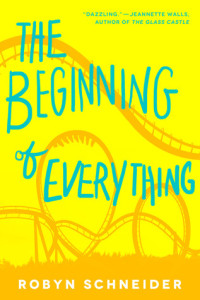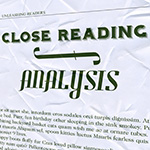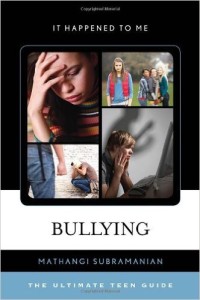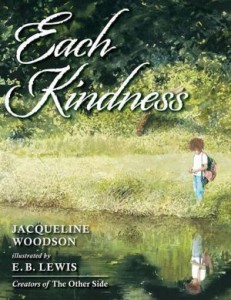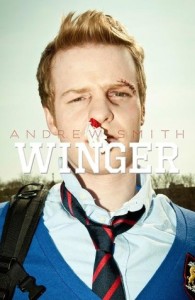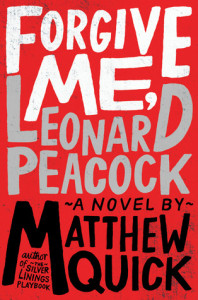
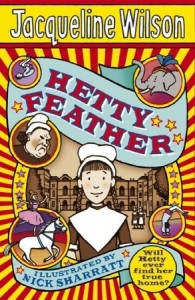
Hetty Feather
Author: Jacqueline Wilson
Published August 5th, 2010 by Random House Children’s Publishers UK
Goodreads Summary: London, 1876 and Hetty Feather is just a tiny baby when her mother leaves her at the Foundling Hospital. The Hospital cares for abandoned children – but Hetty must first live with a foster family until she is big enough to go to school.
Life in the countryside is hard but with her ‘brothers’ Jem and Gideon, she helps in the fields and plays imaginary games. Together they sneak off to visit the traveling circus and Hetty is mesmerised by the show, especially Madame Adeline and her performing horses.
But Hetty’s happiness is threatened once more when she is returned to the Foundling Hospital. The new life of awful uniforms and terrible food is a struggle for her. But now she has the chance to find her real mother. Could she really be the wonderful Madame Adeline? Or will Hetty find the truth is even more surprising?
Jacqueline Wilson will surprise and delight old fans and new with this utterly original take on a historical novel. Set in Victorian times and featuring a brand new feisty heroine, Hetty Feather, this is a Tracy Beaker-esque tale that will thrill young readers. Warm, moving, funny and totally fascinating, it’s the perfect gift for girls of eight and older.
Ricki’s Review: Hetty Feather is a feisty, red-headed little girl. I absolutely loved her spunk and was always rooting for her as she navigated life on the countryside and in the orphanage. Hetty is determined, and she will surely teach young girls to fight for themselves. In turn, she is constantly getting into trouble! I love books that teach girls to be strong and confident, and this one is no exception. I’d love to have a daughter that has the confidence and independence of this young girl. She forms wonderful bonds with her foster siblings and other girls in the orphanage and is extremely loyal to them. I am not surprised that it is so popular in the U.K. and would love for Hetty Feather’s passion and spunk to become more familiar to American girls (and all girls, for that matter)!
Teacher’s Tools for Navigation: I imagine that students who read books about this historical time period will be interested in learning more about the setting. Teachers could help them search for articles and books to learn more about the context of the story. They might also compare Hetty Feather to other strong females of history.
Discussion Questions: Is Hetty Feather too much of a troublemaker or do you think her actions are justified?; Which characters does Hetty bond closely with? What types of people does she pair well with?; Do you think that Hetty’s personality is shaped by the fact that she is an orphan?
We Flagged: “My name is Hetty Feather. Don’t mock. It’s not my real name. I’m absolutely certain my mother would have picked out a beautiful romantic name for me—though sadly I have not turned out beautiful or romantic” (p. 1).
Read This If You Loved: Madeline by Ludwig Bemelmans, Little Orphan Annie by Harold Gray, The Humming Room by Ellen Potter, May Amelia by Jennifer L. Holm, Chains by Laurie Halse Anderson, Esperanza Rising by Pam Munoz Ryan
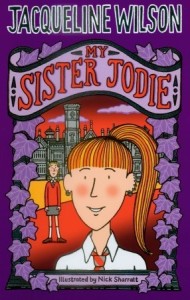
My Sister Jodie
Author: Jacqueline Wilson
Published March 12th, 2009 by Random House Children’s Publishers UK
Goodreads Summary: Pearl and Jodie are sisters. Pearl is the younger one, small, shy and anxious. Jodie is nearly three years older, bold and brash and bad and Pearl adores her. When their parents get new jobs at Melchester College, a Victorian Gothic mansion, the girls spend a bizarre summer holiday in the boarding school with just a few leftover children for company. Things start to change now they are in their new home. Jodie has always been the leader but now it’s Pearl who’s making new friends. When term begins, their strange summer is over. But things keep on changing. Jodie really doesn’t fit in with the posh teenagers in her class. Pearl is blossoming. Maybe she doesn’t need Jodie as much as she used to. But Jodie needs her. And when the school celebration of Firework Night comes around and a tragic event occurs, Pearl realises quite how much she does need her big sister.
Kellee’s Review: I will say that I struggled a bit with getting used to the British lingo, but once I did, it was free sailing. I loved Pearl. She was someone who I wish was my friend. She loved books, had a great imagination, was empathetic, and overall a good person. Jodie was harder to swallow. She was going through what many girls go through in their mid-teens, trying to find herself, and I wish the book had been from her point of view because I wish I understood her more. Instead, we see her from Pearl’s point of view and Pearl loves her sister, but just doesn’t understand her. Also, Pearl, once they reach the boarding school, is working on finding herself and finally making friends. Now, the one person that I probably flat out disliked was their mother. I’d love to talk to someone who has read the book to see if you took her the same way I did…
Also, just for fair warning, this book does elicit many different types of emotions—be ready!
Teacher’s Tools for Navigation: Jacqueline Wilson has had great success in the UK and I can see why. My Sister Jodie will find a whole new group of readers when placed in libraries.
Discussion Questions: What is something that you do/feel that your parents do not understand?; Do you have a sibling? If so, what do they do that you do not understand?
We Flagged: “Jodie. It was the first word I ever said. Most babies lisp Mumma or Dadda or Drinkie or Teddy. Maybe everyone names the thing they love best. I said Jodie, my sister. OK, I said Dodie because I couldn’t say my Js properly, but I knew what I meant. I said her name first every morning.
‘Jodie? Jodie! Wake up. Please wake up!’
She was hopeless in the mornings. I always woke up early – six o’clock, sometimes even earlier. When I was little, I’d delve around my bed to find my three night-time teddies, and then take them for a dawn trek up and down my duvet. I put my knees and they’d clamber up the mountain and then slide down. Then they’d burrow back to base camp and tuck their pretend porridge for breakfast.” (p. 7)
Read This If You Loved: The Wig in the Window by Kristen Kittscher, The Summer of May by Cecilia Galante, The Great Gilly Hopkins by Katherine Patterson
Hetty Feather and My Sister Jodie Recommended For:
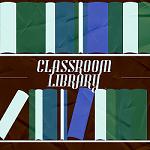
Jacqueline Wilson, known throughout Britain as the most popular writer for girls aged 7-15 has sold over 35 million copies of her books in the UK. She was appointed as the Children’s Laureate from 2005-7 (a prestigious UK award which celebrates outstanding achievement in children’s books) and received an OBE from the Queen in 2002 for services to literacy in schools. In 2008 she was further awarded a DBE in the Queen’s New Year Honour’s List, making her Dame Jacqueline Wilson. Her books contain universal themes popular with children all over the world. Family life, friendship and bullying are regularly featured and her characters often find themselves in difficult circumstances. Her books have been praised for their unique blend of realism and humor, and she is loved by children and parents alike for her non-patronising approach to writing for children.
The book trailers which accompany Jacqueline Wilson’s releases have become a much-anticipated part of the build up to her new releases. Her YouTube channel has over 2,000 subscribers and the most popular trailer, “The Worst Thing About My Sister”, has received 335,000 views.
For the US ebook launch this year, new editions of her most recent 9 titles have been created with exclusive bold photographic covers, many of which use imagery from the book’s trailers:
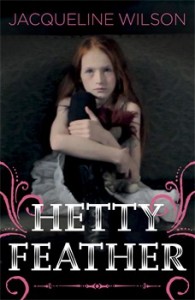
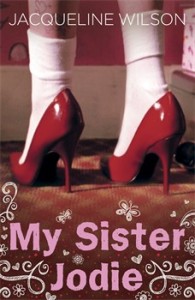
Jacqueline Wilson’s ebooks are available through all major ebook retailers.
Please visit www.jacquelinewilson.us for more information about Jacqueline Wilson and the new collection, including book trailers.
Don’t forget to check out the other stops on the tour:
October 13th: Hetty Feather on Ms Yingling Reads
October 14th: Lily Alone on Ms Yingling Reads, for Marvellous Middle Grade Monday
October 15th: The Longest Whale Song on Ms Yingling Reads
October 16th: Little Darlings on Ms Yingling Reads
October 17th: Hetty Feather on Ms Yingling Reads
October 18th: The Worst Thing About My Sister on Ms Yingling Reads, for Tomboy Friday!
October 19th: Hetty Feather on The Fourth Musketeer
October 20th: Hetty Feather trilogy 1 on Teacher Dance
October 23rd: Excerpt of Hetty Feather on Great British Reads
October 28th: Hetty Feather trilogy 2 on Teacher Dance
October 30th: Excerpt of Queenie on TBC
November 4th: Hetty Feather Triology on Geo Librarian
November 5th: Hetty Feather on Forget About TV
November 6th: Lily Alone on Geo Librarian
November 7th: The Longest Whale Song on Geo Librarian
November 8th: Little Darlings on Geo Librarian
November 9th: The Worst Thing About My Sister on Geo Librarian
November 10th: Queenie on Geo Librarian
November 11th: My Sister Jodie on Forget About TV
See more at: http://www.jacquelinewilson.us/index.php/jacqueline-wilson-blog-tour/
 and
and

